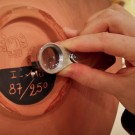What is an Appraisal and Who Needs It?

When people have a piece of art they want to sell they often think that their first step should be to get an “appraisal” so they won’t be taken advantage of.
But what is an appraisal? When your friend who owns an antique shop says, “This is worth about three thousand bucks,” is that an appraisal? How about when an imperious looking chap wearing a bespoke suit and a British accent looks at your painting on THE ANTIQUES ROADSHOW and declares that it would bring $40,000 – $50,000 at auction? Did you get an appraisal?
The dictionary might say both of these are examples of appraisals, but according to the Appraisal Foundation which was authorized by Congress as the source of appraisal standards and appraiser qualifications, to be credible an appraisal must conform to rules that the Appraisal Foundation refines and publishes every two years in a big fat book entitled the Uniform Standards of Professional Appraisal Practice (USPAP). USPAP compliant appraisal reports can run dozens of pages even for single paintings in order to conform to the standards. To jump through the required hoops takes a lot of hours on the part of the appraiser, so USPAP compliant appraisals are expensive propositions. USPAP says that even oral appraisals must conform to all the myriad standards and be documented in a work file, so it is unlikely that any oral appraisal is USPAP compliant. Members of the professional appraisal associations (the Appraisers Association of America, the American Society of Appraisers and the International Society of Appraisers) all REQUIRE their members to perform only USPAP compliant appraisals.
A person needs a pet grooming license in New York City to shampoo your poodle. To come into your house and do an “appraisal” of your silverware, he doesn’t even need a business card that identifies him as an appraiser. Anybody can give you an “appraisal.” For that matter anyone can issue a “Certificate of Authenticity” for your Picasso, which will be just as credible as the issuing party. The whole point of USPAP and appraisal organizations is to make sure that the public can have confidence in appraisals done by unbiased professionals experienced in the business of valuation – not the business of grooming poodles or selling your property to make themselves a profit.
Bottom line, a credible appraisal is usually a lengthy document conforming to USPAP standards written by a member of a professional appraisal group. If you’re dealing with the IRS for a charitable contribution or for estate tax purposes, chances are you need such a document. Your insurance company may also require it to protect your expensive art collection. Perhaps a credible appraisal is necessary in a court situation — a divorce or a lawsuit.
But if you just want to get some idea of what your art is worth so you can sell it, you very well may not need and probably shouldn’t have to pay for a professional, USPAP compliant appraisal report. So ask your dealer friend for his opinion, run it past an auction house if you like, but be aware that the oral “appraisal” you receive may not be worth the paper it’s written on.

